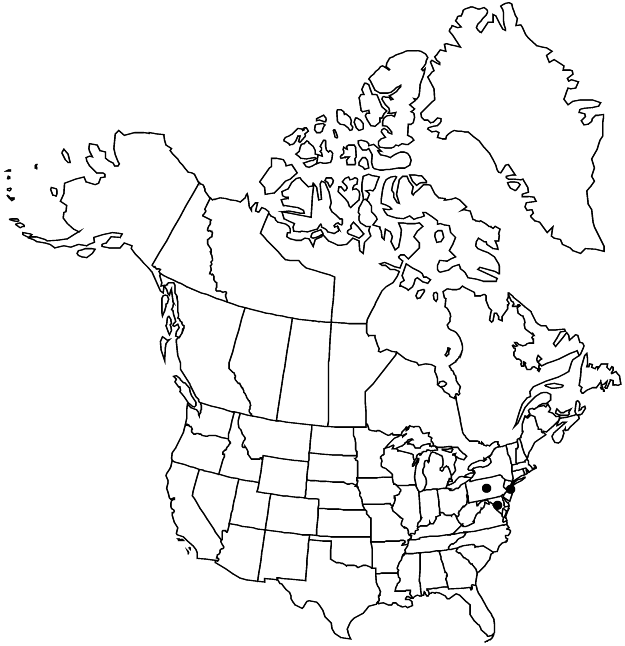Difference between revisions of "Cerastium velutinum var. villossissimum"
Sida 21: 887. 2004.
FNA>Volume Importer |
FNA>Volume Importer |
||
| Line 27: | Line 27: | ||
|elevation=100-300 m | |elevation=100-300 m | ||
|distribution=Md.;N.J.;Pa. | |distribution=Md.;N.J.;Pa. | ||
| − | |discussion=<p>Variety villosissimum grows in coarse grass in seepage areas on the serpentine slopes above Octoraro Creek at Lees Bridge, Chester County, Pennsylvania. Plants of var. velutinum with normal pubescence and leaf width grow nearby on the serpentine outcrops. The pubescence, leaf, and habit characters of var. villosissimum are controlled genetically (D. J. Gustafson et al. 2003) and segregation occurs in plants grown from seeds collected at Lees Bridge. These characters are displayed in varying degrees in plants growing on the serpentien barrens and outcrops in surrounding areas of Maryland, New Jersey, and Pennsylvania.</p><!-- | + | |discussion=<p>Variety villosissimum grows in coarse grass in seepage areas on the serpentine slopes above Octoraro Creek at Lees Bridge, Chester County, Pennsylvania. Plants of <i></i>var.<i> velutinum</i> with normal pubescence and leaf width grow nearby on the serpentine outcrops. The pubescence, leaf, and habit characters of <i></i>var.<i> villosissimum</i> are controlled genetically (D. J. Gustafson et al. 2003) and segregation occurs in plants grown from seeds collected at Lees Bridge. These characters are displayed in varying degrees in plants growing on the serpentien barrens and outcrops in surrounding areas of Maryland, New Jersey, and Pennsylvania.</p><!-- |
--><p>Variety villosissimum is in the Center for Plant Conservation’s National Collection of Endangered Plants.</p> | --><p>Variety villosissimum is in the Center for Plant Conservation’s National Collection of Endangered Plants.</p> | ||
|tables= | |tables= | ||
| Line 55: | Line 55: | ||
|publication year=2004 | |publication year=2004 | ||
|special status= | |special status= | ||
| − | |source xml=https://jpend@bitbucket.org/aafc-mbb/fna-data-curation.git/src/ | + | |source xml=https://jpend@bitbucket.org/aafc-mbb/fna-data-curation.git/src/8f726806613d60c220dc4493de13607dd3150896/coarse_grained_fna_xml/V5/V5_192.xml |
|subfamily=Caryophyllaceae subfam. Alsinoideae | |subfamily=Caryophyllaceae subfam. Alsinoideae | ||
|genus=Cerastium | |genus=Cerastium | ||
Revision as of 18:37, 18 September 2019
Decumbent sterile shoots well developed, 5–15(–20) cm. Leaves marcescent, overlapping and obscuring stem; blade broadly lanceolate to ovate, densely villous. 2n = 72.
Phenology: Flowering spring.
Habitat: Serpentine outcrops and barrens
Elevation: 100-300 m
Discussion
Variety villosissimum grows in coarse grass in seepage areas on the serpentine slopes above Octoraro Creek at Lees Bridge, Chester County, Pennsylvania. Plants of var. velutinum with normal pubescence and leaf width grow nearby on the serpentine outcrops. The pubescence, leaf, and habit characters of var. villosissimum are controlled genetically (D. J. Gustafson et al. 2003) and segregation occurs in plants grown from seeds collected at Lees Bridge. These characters are displayed in varying degrees in plants growing on the serpentien barrens and outcrops in surrounding areas of Maryland, New Jersey, and Pennsylvania.
Variety villosissimum is in the Center for Plant Conservation’s National Collection of Endangered Plants.
